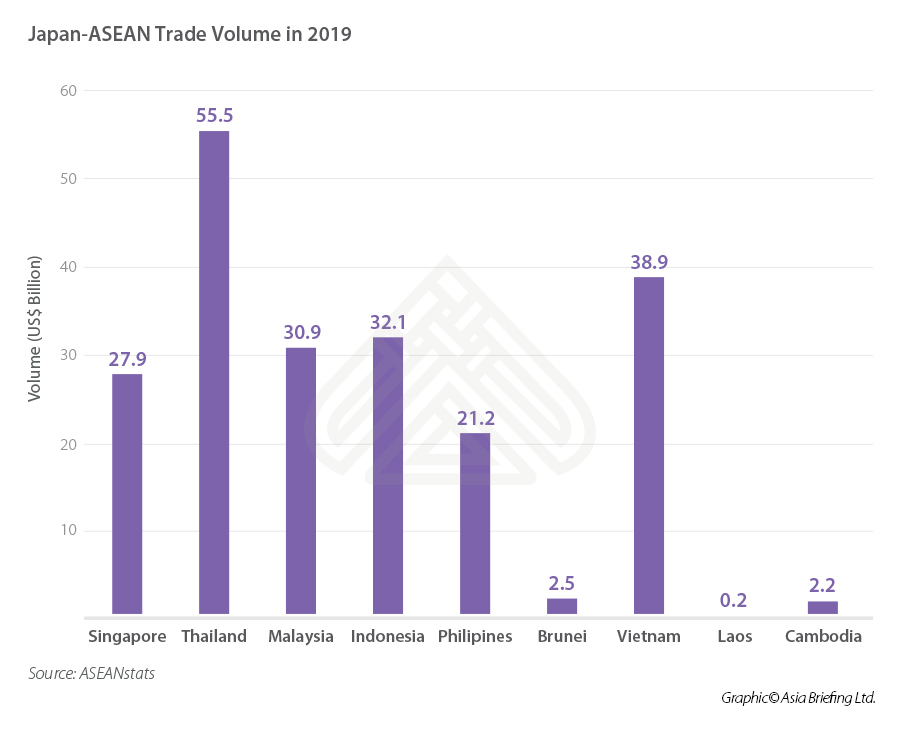Protocol Amending AJCEP Comes Into Effect: What It Means for Investors in Vietnam

On August 1, 2020, the first protocol to amend the ASEAN-Japan Comprehensive Economic Partnership (AJCEP) between Japan and five members of the Association of Southeast Asian Nations (ASEAN) went into effect.
While the AJCEP was first implemented in December 2008, the first protocol amending the FTA will promote further trade and investment between Japan, Laos, Myanmar, Singapore, Thailand, and Vietnam.
To understand its implications for businesses and investment opportunities in Vietnam, Vietnam Briefing will discuss major changes of the new protocol.
Background
The AJCEP was Japan’s first multilateral free trade agreement (FTA), which is based on the bilateral Economic Partnership Agreements (EPAs). EPAs are agreements signed by two or more countries designed to create a free trade area involving reciprocal economic integration and participation.
Prior to this, Vietnam and Japan had also signed an EPA named the Vietnam – Japan Economic Partnership Agreement (VJEPA), which gives more preferences to bilateral trade and investments than under the AJCEP. The two FTAs can coexist, and businesses can choose to apply the more favorable depending on their operation.
The first protocol to amend the AJCEP assumes special relevance for three countries that do not have bilateral FTAs with Japan, namely Laos, Myanmar, and Cambodia. Further, it also includes new rules and liberalization commitments from ASEAN countries that are not included in their bilateral EPAs and related agreements.
Japan – ASEAN trade and investment
According to the Japan External Trade Organization (JETRO), ASEAN was Japan’s third-largest trading after China (including Hong Kong), and the US. In 2019, trade volume between Japan and the bloc reached US$214 billion, with Japan posting a trade deficit of US$2 billion.
Japan is also attracted by ASEAN’s growing market potential and openness. In the past five years, Japanese investors allocated an average US$20 billion per year into the region.
As of 2019, there were more than 13,000 Japanese companies operating in Southeast Asia, and more than 200,000 Japanese citizens living and working in the region. A survey by the Japan Bank for International Cooperation (JBIC) in 2019 revealed that more than 56 percent of Japanese firms were looking to expand their business in ASEAN countries in the coming years, particularly Vietnam, Indonesia, and Thailand.
The Japanese government has also recommended Japanese businesses from diversifying their supply chains to ASEAN to cope with the on-going US-China trade war, the Japan-China territorial dispute, and the COVID-19 pandemic.
To this effect, the Japanese government in April issued a US$2.4 billion economic support fund to help finance Japanese businesses that bring manufacturing back to Japan or look at other countries in Southeast Asia.
What this protocol means for Vietnam
Japan has been one of Vietnam’s top trading partners, investment sources, and foreign aid providers. In recent years, Vietnam has emerged as an attractive investment destination and supply chain relocation option for Japanese enterprises.
According to JETRO, 64 percent of Japanese businesses plan to expand their current operation in Vietnam, and 43 percent of responders said Vietnam was their first relocation choice.
In this context, the protocol aims at promoting, facilitating, and protecting Japanese trade and investment opportunities in ASEAN countries, including Vietnam. Similarly, Vietnam also made major commitments to allow market access, relax rules on commercial presence and the movement of natural persons for a number of industries and services, in order to attract more investment and reap trade opportunities from Japan.
—————————
This article is produced by Vietnam Briefing, a premium source of information for investors looking to set up and conduct business in Vietnam. The site is a publishing arm of Dezan Shira & Associates, a leading foreign investment consultancy in Asia with over 27 years of experience assisting businesses with market entry, site selection, legal, tax, accounting, HR and payroll services throughout the region.

